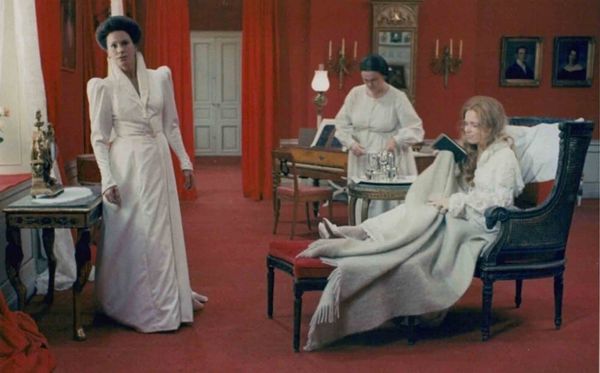Eye For Film >> Movies >> Cries And Whispers (1972) Film Review

As a clock slowly ticks in a manor house at the turn of the century, the life of Agnes (Harriet Andersson) ebbs away. Housebound in the family home, she is comforted by the presence of her two sisters, Karin (Ingrid Thulin) and Maria (Liv Ullman), as well as her devoted maid Anna (Kari Sylwan). However, she does not realise the rift that has grown between her sisters and the pains that they endure.
This hypnotic dream play was a high point for Ingmar Bergman after a period of melancholy caused by the death of his father and his perceived dismissal by the film world. This despair permeates the film as vividly as the colour which washes over the characters. It is film which touches the viewer compassionately and yet leaves them feeling almost as distant from the characters as they are from each other. As well as Agnes's illness, Karin suffers in an emotionless marriage - "a tissue of lies"- Maria feels the passage of time taking away her youth and Anna carries the burden of the death of her child.

It is the detail in the film which attracts the attention. Bergman visualises a scene where four women, all in white, sit in a vivid red room. Each room in the manor is a subtly different shade of red and the period costumes (from the late 1800s) are full of frills and lacing. One of the key scenes shows Anna undressing Karin before Karin carries out a bloody act of defiance against her husband. A substantial amount of praise must be lavished on the cinematographer Sven Nykvist, who won an Oscar for his efforts. Both internal and external shots are exquisite, often with the camera framing the face in close up, or setting the scene with a long shot which places the characters at a distance from each other.
The acting by the four women is excellent. Ullman had by this point broken her relationship with the director, but both her and Thulin produce poignant performances as the two sisters torn apart by a mother's favoritism. As a film, Cries And Whispers is not the cheeriest but nevertheless it is a masterful portrayal of estrangement.
Reviewed on: 29 Mar 2002

















